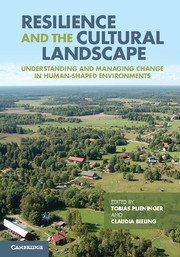 Resilience and the Cultural Landscape
Resilience and the Cultural Landscape Book contents
- Frontmatter
- Contents
- List of contributors
- Preface
- Part I Conceptualising landscapes as social–ecological systems
- Part II Analysing landscape resilience
- 7 In search of resilient behaviour: using the driving forces framework to study cultural landscapes
- 8 Cultural landscapes as complex adaptive systems: the cases of northern Spain and northern Argentina
- 9 Linking path dependency and resilience for the analysis of landscape development
- 10 The sugar-cane landscape of the Caribbean islands: resilience, adaptation and transformation of the plantation social–ecological system
- 11 Offshore wind farming on Germany’s North Sea coast: tracing regime shifts across scales
- Part III Managing landscapes for resilience
- Part IV Perspectives for resilient landscapes
- Index
- References
11 - Offshore wind farming on Germany’s North Sea coast: tracing regime shifts across scales
Published online by Cambridge University Press: 05 November 2012
- Frontmatter
- Contents
- List of contributors
- Preface
- Part I Conceptualising landscapes as social–ecological systems
- Part II Analysing landscape resilience
- 7 In search of resilient behaviour: using the driving forces framework to study cultural landscapes
- 8 Cultural landscapes as complex adaptive systems: the cases of northern Spain and northern Argentina
- 9 Linking path dependency and resilience for the analysis of landscape development
- 10 The sugar-cane landscape of the Caribbean islands: resilience, adaptation and transformation of the plantation social–ecological system
- 11 Offshore wind farming on Germany’s North Sea coast: tracing regime shifts across scales
- Part III Managing landscapes for resilience
- Part IV Perspectives for resilient landscapes
- Index
- References
Summary
Introduction
Ecosystems have been converted in many parts of the world to meet human needs (MA, 2005). A rather new development has been the increasing exploitation of marine areas for human activities (Kraberg et al., 2011). Offshore wind farming (OWF) introduces significant new dynamics in the social–ecological systems concerned (Punt et al., 2009). Given the complexity of coastal and marine systems, and the fragile balance that exists in these systems between use and overuse, it is important to understand the potential consequences of OWF development and the processes that lead to system change. A key question is how OWF-induced changes manifest themselves in the ecological and social subdomains and whether changes in one domain can trigger changes in the others (Kinzig et al., 2006). Offshore wind farming has already been shown to have multiple impacts on marine ecological systems (Wilhelmsson & Malm, 2008), but how does this relate to changes in the marine landscape (seascape) and the socioeconomic system on the coast?
This chapter embeds OWF in a complex social–ecological system, which consists of marine ecosystems and planned OWF sites in the North Sea on the one hand and the administrative districts of North Frisia and Dithmarschen (Germany) on land on the other (Figure 11.1). The dynamics of the OWF system can be characterised broadly as follows. Nationally, economic instruments such as the German Renewable Energies Act provide a stimulus to private sector agents to invest in large-scale OWF projects (Figure 11.2), which then affect the integrity of marine ecosystems. This, in turn, impacts on the production of ecosystem goods and services utilised by humans, with attending impacts on human well-being (Busch et al., 2010; Kannen & Burkhard, 2009). Impacts on human well-being include direct impacts of OWF on the coastal economy through employment and income generation, but also indirect impacts on personal well-being through changes in marine ecosystem service provision. Using resilience and ecosystem services as conceptual background, this chapter focuses on possible regime shifts in the sea and effects across scales that may be triggered by OWF. It questions how regime shifts and their consequences can be traced and whether the resilience of a particular system should be encouraged.
- Type
- Chapter
- Information
- Resilience and the Cultural LandscapeUnderstanding and Managing Change in Human-Shaped Environments, pp. 185 - 202Publisher: Cambridge University PressPrint publication year: 2012
References
- 2
- Cited by


